Yesterday Pocket Books released Star Trek: Section 31: Control, written by New York Times bestselling author David Mack. The book centers on Star Trek: Deep Space Nine’s Doctor Julian Bashir as he continues his personal quest to take down the illegal spy organization Section 31. This is Mack’s second novel in this series, following 2014’s StarTrek: Section 31: Disavowed. TrekMovie talked to the author about Control and its modern parallels, how Section 31 fits into the Star Trek universe and what Bashir has been up to in the novels following the DS9 finale.
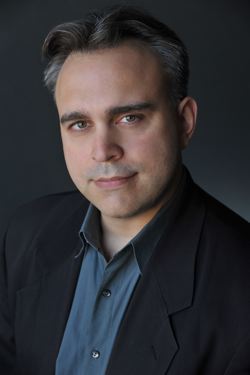
Author David Mack
Mack On Section 31 And Julian Bashir’s Quest To Take It Down
TrekMovie.com: As noted on the back cover description for Control, Section 31 is as an “amoral” organization working on behalf of the Federation. It was yet another dark and controversial introduction into Trek lore from Star Trek: Deep Space Nine, a show which you worked on as a writer. What do you say to those who feel Section 31 doesn’t fit into the more utopian Roddenberry vision of the 24th century as seen on Next Generation and Voyager?
David Mack: I can’t speak to what Gene Roddenberry would have thought of Section 31. What I do know is that while humanity has often aspired to live in utopias, in fiction they tend to be deadly dull. Even one of the most famous utopias, the Garden of Eden, wasn’t terribly interesting until the Serpent arrived to bring temptation and crash the whole thing down.
That said, I can certainly understand the objections of Star Trek fans who feel that the mere existence of Section 31 undermines all that the Federation stands for — and that’s a view shared by many of the principal characters of the various series, particularly Doctor Julian Bashir.
One thing I’ve never understood is why even a small subset of Star Trek fandom would want a Star Trek: Section 31 television or film series. If there’s one thing the show and novels have always been clear about, it’s that Section 31 are not the heroes, and they do not deserve to be presented as people for whom we should desire success.
TM: DS9 introduced the notion of Dr. Julian’s Bashir’s interest in espionage, literally making it into a joke with “Our Man Bashir.” Section 31 and their dealings with Bashir was introduced two seasons later. What is it about Bashir that most motivates you to write about him and what is it that motivates him so mush to want to take down Section 31?
DM: I’ve long been drawn to Bashir because I felt a kinship with the character. When I was young I ended up enrolled in the “talented and gifted” programs offered by my schools, and I tended to test a few grade levels ahead of most of my peers. As such, I always felt out of step with my classmates, academically speaking, and as I entered adolescence I sometimes felt the urge to conceal these talents and abilities in order to fit in more easily. In that regard, I sympathized with Bashir’s lifelong struggle to hide his true nature as a genetically enhanced human with superior senses, reflexes, and intellectual talents.
As far as Bashir’s near-fanatical devotion to opposing Section 31, it goes to the heart of his nature. He is a romantic and an idealist. He believes fervently in the public image of the Federation, and as both a citizen and as a Starfleet officer, he considers it his duty to defend those ideals against subversion or betrayal. He was deeply offended by Section 31’s invitation to him during the episode “Inquisition,” and was appalled by their boast that they are accountable only to themselves. Section 31 represents a fascistic, autocratic subculture within the Federation, one that is antithetical to that society’s core values. To Bashir, they are a cancer to be excised.

Sloan and his fellow Section 31 operatives in “Inquisition”
Julian Bashir Has Been Busy Since DS9
TM: If a fan of Deep Space Nine hasn’t been reading the novels, but decided to pick up Control, how much of Bashir would they recognize so many years on? And what are the biggest changes youve brought to the character since “What You Leave Behind?”
DM: Bashir has undergone some serious life changes since the events of the DS9 series finale. And I’m not just talking about the fact that he grew a beard.
He was drawn into intelligence work by his former love Sarina Douglas (of the Jack Pack, which was introduced in the DS9 episode “Statistical Probabilities,” and whom Bashir cured of her “locked-in” state in the episode “Chrysalis”), with whom he reunited romantically during their covert mission to the Breen homeworld (novel Typhon Pact: Zero Sum Game).
In the DS9 post-finale novels, it was revealed that the Andorian people had been suffering a centuries-long fertility crisis that was threatening the continuation of their species. Doctor Bashir led a team of researchers that discovered the Federation had long suppressed information that could have cured the Andorians. Defying a reactionary Federation president pro tem, Bashir employed his Section 31 contacts to steal the information and then used it to cure the Andorian people, making him a folk hero to some and a pariah to others. It got him court-martialed and drummed out of Starfleet — but when an Andorian won the next presidential election, it also earned him a pardon. (The Fall, Book III: A Ceremony of Losses).
When we see him in my two Section 31 novels (Disavowed and Control), he is a civilian doctor living and working on Andor, the only Federation world that will issue him a medical license. He is living with Sarina Douglas, who has left Starfleet and now serves in the Federation Security Agency (a civilian intelligence service) as a covert operative. By now Bashir is older, wiser, a bit jaded, but still committed to taking down Section 31, which he has infiltrated as a double agent.
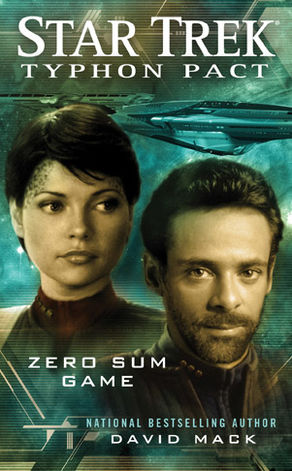
Mack’s 2010 novel is one of many that have been telling the tale of Bashir’s life after Deep Space Nine
Control’s Modern Parallels
TM: The issue of espionage is quite topical. For you, do you see this as a classic Star Trek-as-allegory story and how does Control explore the issues of the modern surveillance state?
DM: A big part of my inspiration for Control has been my growing frustration with, and apprehension of, the burgeoning U.S. surveillance state.
Between the marked increase in CBP harassment of international travelers (including U.S. citizens), the increasingly lax oversight of the FISA Court, the spread of the NSA’s Echelon data dragnet, and, just today, the passing of a law by Congress to strip the American people of legal privacy protections online, all in the name of commerce and power, we live in terrifying times.
Extrapolate from our present circumstances and ask, “What would happen if we built a system to monitor all this and analyze it with predictive algorithms for the sake of law enforcement and national security? And what if that system slipped its subtle bonds of command and control and started doing things its own way? What would we do then?”

David Mack drew inspiration for Control from his “frustration” with “the burgeoning U.S. surveillance state”
New Star Trek Novels Are Free To Get ‘Bloody’
TM: They say you shouldn’t judge a book by its cover but this one stands out and you yourself described it as “blood-soaked.” You have obviously written novels all over the different Star Trek eras and properties. Do you see it as either expected, or possibly even an opportunity, to up the level conflict and violence when dealing with DS9 books and characters?
DM: Since shortly after the feature film Star Trek: Nemesis marked the apparent end of the prime timeline in Star Trek (at least until the premiere of Star Trek: Discovery), the novels and other narrative tie-ins to Star Trek have been granted a lot more freedom to alter the status quo in our fiction, and to tell the kinds of stories that might not have been approved in the past.
While the novels have, for the most part, tried to steer clear of excessive gore or explicit sexual content, and we’ve tried to be sparing with the use of mild profanity, we have taken advantage of the greater freedom afforded us since roughly 2003 to tell bolder, bigger, more consequential tales. In my case, many of those stories have been action-packed and violent. I think someone once described my second full-length Star Trek novel, a TNG adventure titled A Time to Heal, as “the most graphically violent Star Trek novel ever written.” I may have topped it since then.
As far as Control, I wanted a blood-red cover to fit the story, which is brutal, tense, violent, and — by the end — genuinely bloody. It probably won’t surprise anyone to learn that I was in a rather angry state of mind when I wrote the outline.
David Mack’s Star Trek Section 31: Control was released on Tuesday, March 28 and retails for $7.99. It is available discounted at Amazon in paperback and ebook. You can also purchase a signed copy at David Mack’s website.
You can find David Mack online at davidmack.pro or on Twitter @DavidAlanMack.
Part 2 of David Mack interview coming soon
TrekMovie has more with David Mack, where he talks about writing the first novel tie in to the upcoming CBS All Access series Star Trek Discovery, his next Titan novel, thoughts on the book he wrote in 2010 tied into the Kelvin universe and more. Keep an eye out for that later this week.

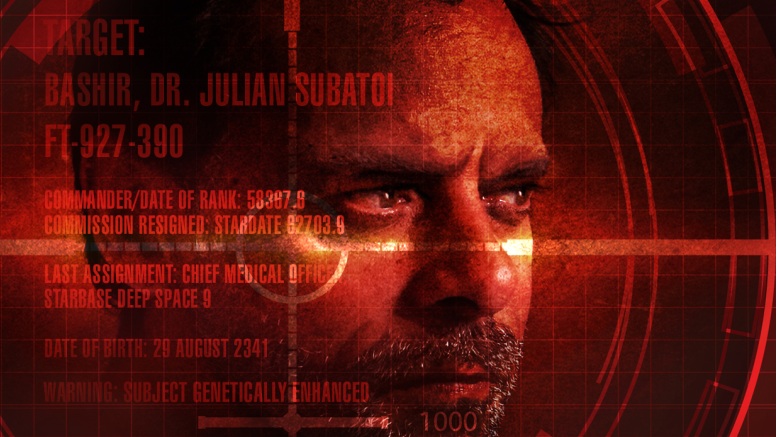
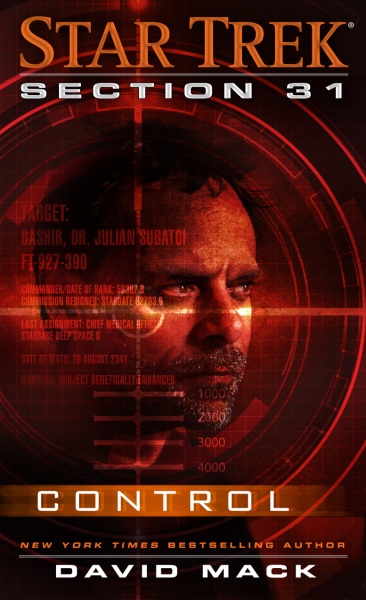
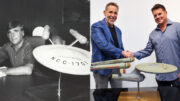
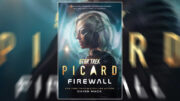

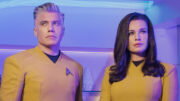
If it wasn’t for the poorly considered reason that I have kids and bills now, I’d visit some ‘Big Book chain’ more often (because now, I have kids = I visit the Library a lot more now… But in my defense, I’m not in the Navy anymore. It would be a lot more weird standing in line at the Grocery Store reading a good book than in a chow line (or line to Medical/The Liberty Boat/Etc)…
~Pensive’s Wetness
Hmmm…a timely piece of fiction from David Mack. I wonder if its creep factor takes it to the realm of horror as seems heavily hinted at?
Section 31 is illegal? I’m basing myself only on canon here, but both ENT and DS9 make it clear that it’s legal, no matter what its morals are.
As to Bashir’s view of it, I refer you to the closing scene in Inter Arma Enim Silent Leges:
BASHIR: Bashir to Security.
ODO: Odo here.
BASHIR: Never mind. My mistake.
Yes, Bashir took measures to save Odo’s life. He did not try to bring down Section 31 entirely.
ETA: OK, maybe he would have liked to bring it down. But he certainly knew things weren’t black and white, and he wasn’t being rational at that moment.
One last thing: Sisko himself did some pretty immoral things, and said he would do them all over again, and that he could live with that.
Speaking as someone who hasn’t dived into the novels in a while, why would anyone think there would be no intelligence services in the Federation? Utopia or not, ignoring threats, internal or external, is never a good idea.
Phil,
Re: Espionage
Not just that, but doesn’t the whole Prime Directive force the Federation to become an espionage employing culture in regards to newly encountered civilizations? I mean, don’t they disguise themselves as the locals, blend in and keep secrets from them? And wouldn’t the Prime Directive be fairly ridiculous if it didn’t apply to all spacefaring Federation citizens and ONLY just the members of Starfleet?
Maybe it’s the amoral aspect? But what do those with such concerns make of Kirk’s espionage in THE ENTERPRISE INCIDENT? Isn’t stealing the cloaking device morally wrong? And if the cloaking device is somehow a greater moral wrong that can justify a “lesser” theft’s, what are we to make of Kirk turning around and using this thing which is morally wrong to use, to make his escape?
@Disnivited, thank god there was no section 31 in TOS, or there would have been operatives on board who would have gotten Kirk into the predicament, and changed the whole morality questions raised by it. I’m happier that this was a mission that Kirk and Spock were sent on themselves. Somehow it’s more acceptable to me, just like the army sergeant given a top secret mission to retrieve something from the enemy — he’s a regular guy given a mission, not some secret unchecked spy organization. But clearly it’s a moral question that must be answered for everyone individually. However, I view it somewhat like our cold war — the era in which the story was imagined. The Federation couldn’t allow another dominant force in the galaxy the ability to upset the balance of power so wildly with such a powerful piece of technology. The weird thing is, all future installments of Trek seemed to forget all about the fact that they took it, leaving them essentially defenseless against cloaking technology they had, but promised not to use. At a minimum, I would have thought having it would have allowed them to defeat it. Oh well. As to Kirk using it to make his escape, well, that’s entirely acceptable behavior assuming you accept the moral validity of the mission in the first place — what good does retrieving the technology do you if you die after having done so?
Curious Cadet,
Re: …what good does retrieving the technology do you if you die…
Because, as in most spy missions, information was the commodity being sought. Once Mr. Scott scanned that thing and sent that information off through subspace, the mission was a success. And we know he scanned it, because how else could he have figured out how to hook it up and make it work?
Not to mention Kirk not taking a moment to consider that such an important piece of military technology might already be rigged to self-destruct, Mr. Scott seemed to have some concerns in those regards, if not connected in a proscribed sequence and hasten whatever death they were trying to stave off.
And by the way, an undead Kirk in command of the Enterprise losing to ONLY 3 Romulan ships??!!! What are the odds of THAT ever happening? ;-)
Kirk’s working cloak was far from an intelligence gathering necessity, more like casualty insurance…icing on the cake.
I always liked the moral ambiguity section 31 portrayed….as Sisko said, “it’s easy to be a saint in paradise.” I also appreciated how the writers of ds9 tried to explore how a government protects their “paradise.” Bashir also seems conflicted about the role they played protecting the federation. Having read a few of the section 31 novels I am not sure that the ambiguity of the series makes it into the novels. It’s much more of a black and white issue.
Also Sarina Douglas was Bashir’s patient and therefore their romance is wrong in my eyes. I get the fact that she is not his patient anymore but it’s a storyline I was never comfortable with either in the show or the novels.
Nachum,
Re: illegal
Well, it all boils down to whether one accepts that The Prime Directive is THE law of the land?
If so, then Section 31 may have been sanctioned, and that may have given it quasi-legal legitimacy in its creation, but its flagrant violations of the supreme law of the land over the centuries has definitely made it illegal.
In many ways, I think a good reference for how Section 31 should behave is the “La Femme Nikita” franchise. The goal of featured organization, Section One, is to tackle those problems that can’t be dealt with by normal means. But in practice, the organization’s actions could be outright “amoral”. The conclusion of the franchise had the main character, “Nikita”, eventually (SPOILER!) takes over Section One, in hopes to steer the organization towards better pursuits. Personally, I am surprised that Dr. Bashir wants to destroy an organization that has helped him and the Federation in the past.
Welcome back Anthony.
“the illegal spy organization Section 31.”
DS9 confirmed everything Section 31 does is actually *completely legal*. The organisation is supported by Starfleet Command and derives its authority directly from a loophole in the Federation’s Constitution. Technically it’s people who actively oppose Section 31’s actions that are breaking Federation law. That’s the nasty twist.
”One thing I’ve never understood is why even a small subset of Star Trek fandom would want a Star Trek: Section 31 television or film series. If there’s one thing the show and novels have always been clear about, it’s that Section 31 are not the heroes, and they do not deserve to be presented as people for whom we should desire success.”
People would want this for the same reasons that make Breaking Bad, The Americans and Black Sails such compelling dramas. The lead characters in all those shows are actually the villains of the story, something that’s occasionally made shockingly clear.
Same reason DS9’s “In the Pale Moonlight” was so good too. Vreenak was actually ‘one of the good guys’ in that episode, from start to finish. Sisko, Garak and (since they authorised the conspiracy) Starfleet Command were all the villains of the piece. In the end, their actions proved Vreenak’s hostility towards Starfleet was completely justified. But the episode showed events from the perspective of the villains, including Sisko’s famous monologue at the end.
Clever stuff.
Section 31 undermined Trek in my opinion, in the same way STID did. The Federation may have been bureaucratic, but it was never sinister. Even in TNG that only happened when an alien species invaded Starfleet, at least in the beginning. I could be wrong but Section 31 first appeared after Rodenberrys death? STID was all about corruption of the organization, and that was not the vision that inspired a generation of fans to reach for the stars. Section 31 violates a cardinal rule in my opinion, which was to depict our own current conflicts via an arms-length alien surrogate. It kept the perspective clear — our crew got caught up in an alien conflict which may have mirrored our own topical conflict, but allowed us the perspective necessary to reflect on our own society without tarnishing the characters.
The only thing worse than Section 31 was probably the Temporal Agency.
actually it was a good idea to take a frivolous thing like bashir’s fixation on first garak the spy and then a holodeck fantasy before moving it towards real espionage and the dominion war.
that conflict tested the moral fibre of the federation and so did the reveal of section 31 thriving in that conflict as it did after the xinidi affair.
man, I miss ds9.
Humanity will never live in a utopia as envisaged by Roddenberry.
Watch the news… we are thousands of years away from utopia…
I think Section 31 makes a good subject for a book; not so sure it’s good for the Trek universe. It might work in the TNG universe, which featured few civilizations on a higher level than the federation, but how could 31 operate against the Melkot, the Organians or the Metrons — you can’t hoodwink them. Kirk couldn’t lie to anybody like that. Not to mention the possible reprisals.
Well all those species still exist in TNGs time. Just because they weren’t shown doesn’t mean they werent there. And you still have Q lol. Section 31 was also used in STID.
And of course Section 31 isn’t all powerful. They will have limits to what they can do against certain species. But you can say that about ANYTHING, including how well Starfleet can defend against higher species too. End of the day Section 31 is really just to try and defend the Federation against enemies as best they can but also remember it doesn’t always do it alone either meaning they also make allies anywhere they can to help their purpose.
Yeah, agree with most of that. My main point is that it was Kirk’s basic decency and morality which saved him during many episodes of TOS. Had that Metron “kid” found out about 31 (retconned?), he might have just blown the Enterprise away and sent the Gorn about their business. And Balok might have decided to wait a bit longer before contacting humans. As for the Melkot, it wouldn’t have been pretty.
Don’t forget Section 31 tried to blow up Kirk and the Enterprise too lol. They would’ve took it as a minor loss and kept going. ;)
All seriousness sure, thats all possible. But thats what real life intelligence agencies deal with. Their actions could make things worse if they screw it up. Thats the gamble but Section 31 is a cunning group.
Bashir was always one of Starfleet’s & the Federation’s Hopefuls and to himself as well , but ultimately rejected by them , because in a sense he was of the Khan genetic line . And we have contemporary examples too , in Edward Snowden , Julian Assange and Chelsea Manning , who rejected America’s political amorality , now represented by and in a Republican Hawk President ? Bashir is looking more like Sisko than ever !
“The burgeoning U.S. surveillance state”? It’s been burgeoning since at least 2001, when Trek was still on the air (and didn’t cover it).
Gary M,
FOI has shown it growing since the days of J. Edgar Hoover, but for so long it’s been like the old saw about the frog in the pan of tepid water where the heat is gradually ever so slowly incremented so the frog doesn’t notice anything until it’s too late. However, since the rise in the ubiquity of computers, it’s burgeoned to the point where it happens to you in the wink of an eye.
Nice article, cannot wait to read. Tidbit about congress stripping online rights is wrong however. They were not in effect so we lost nothing….